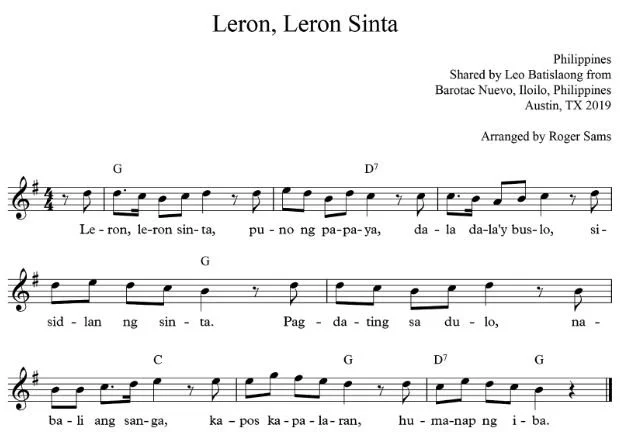LERON, LERON SINTA
November 18, 2019
by Lorelei Batislaong
When I told my dad I wanted to learn a Filipino song to include in my classroom, I was certain I’d never seen him smile so wide in my life. It struck me how much it meant to him to be asked to share his knowledge, and I cherished the following conversations in which I brought him the lyrics I found, discussed if the translation was correct, learned the pronunciation as best I could, and double checked the meaning of the song.
I am lucky to have this type of access so close and available to me. For many teachers, this is not always the case. But that doesn’t mean we abandon the endeavor altogether. When we spend time with people from different cultures, we make strides in understanding and appreciating where they come from. When we do so with cultures that have been historically ignored, marginalized, or erased then we are decolonizing and decentering the dominant culture.
Finding resources
Nothing tops hearing from the people who embody the culture. They are the culture. Look around. Have you taken steps to create a relationship with the people around you? Research your city. Are there organizations that center around communities that may have information for people interested in their culture or even classes you can attend? If all else fails, when used responsibly and sensitively, the internet makes the world a very small place.
Start by doing the work
I say this a lot because it can be used in so many different contexts. When I approached my father to help me with this project, I made sure I had done as much prep work as I could. It would have been very easy for me to let him do everything. But that puts all the labor on him when I can shoulder some of that burden. I researched the lyrics, found several sites, collected what I judged as the consensus among them, and then brought those lyrics to him.
After we completed the transcription, I make sure to credit my father as the source of Leron, Leron Sinta. Anonymous has to be the most prolific song composer out there. Nowadays, though, we have no excuse. Cite your source!
Listened, restated, and then listened some more
Talking with my dad about this song meant, he talked, and I listened. He led the conversation and included what he felt was important to know. That meant hearing about riding his water buffalo to school singing this song. (We both thoroughly enjoyed that story.) It meant I was engaged and asked follow-up questions. (Because who doesn’t want to know more about riding a water buffalo?) It meant I restated things he said to make sure I understood fully what he meant. And between each of those “it meant-steps” I did not talk. I LISTENED.
Trust the experts
I approached my father with this project knowing that he is the expert. There has to be a release of ego to consciously remove yourself as the center of the conversation. Listen and trust experts.
Leo: I used to sing this riding my water buffalo on the way to school.
Lorelei: Your water buffalo?
Leo: Yes. It’s what we did. I remember being in first grade and learning this song. We’d sit at our desks and they’d start singing, “Leron, Leron sinta…”
Lorelei: Did mom learn the song, too?
Leo: I think so. But I don’t think she sung it while riding a water buffalo.
This is the first verse of Leron, Leron Sinta. It tells the story of a couple walking among papaya
trees. Papaya is a staple of the Filipino diet. One person climbs to the very top of a papaya tree to
gather fruit, but on the way up one of the branches snaps and they fall. The other person, rather
than being upset, decides they’ll just find a new person. (Since they both appear in later verses, I
assume the one who fell was okay.)
I remarked to my dad how much it reminded me of Jack and Jill with the falling and tumbling
but with a decidedly independent twist at the end. He laughed and agreed with me.
If you would like to sing this with your students, consider singing the melody an octave lower or changing the key as I did for the included recording. (I attempted to sing in the key of D.)
A note about the recording: I am not a native speaker of Tagalog, the language of the
Philippines. As I learned the song, I asked my dad to listen to me and tell me what he thought of my pronunciation several times. He said, “It was good, but you have an accent. That was expected.”
This really put me in a self-conscious state of mind. After I sat in that discomfort, I was able to
see how many students who do not speak English as their first language might feel exactly the
same when asked to sing in English in front of their peers. How this could cause anxiety and
perhaps manifest into a refusal to participate, which teachers might not connect with being self-
conscious but be quick to label as being uninterested, not capable, or even defiant. How
unfortunate is this.
I also saw how much my dad loved sharing this with me and how proud he was of where he grew
up. That sense of agency and efficacy is something we can always support in our students by
letting them shine in the ways that make them unique.
For a recording of this song, check out the Mabuhay Singers version of Leron, Leron Sinta on the album, Halina’t Umawit, track 2 (Album can be found on Spotify and iTunes).



